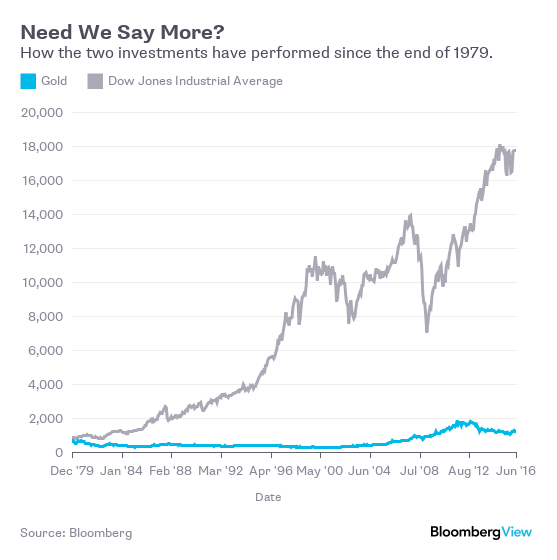I Don’t Hate Gold. I Just Don’t Love It.
The precious metal isn’t an investment in the normal sense. It’s just a bet on a price change.
Bloomberg, June 23, 2016
I don’t hate gold.
That may be hard for some of you to believe. You have read critical things from me about gold, the miners and the quasi-religious fervor surrounding the shiny yellow metal. Some of my commentary about it the past few years (see this and this) may have led some of you to pigeon-hole me as an anti-gold evangelist.
But here is the thing: The underlying reason I love to write about gold is because it offers so many lessons about the behavioral errors of investors. Whether you like to trade stocks, bonds, commodities, real-estate investment trusts, exchange-traded funds or gold, you are subject to these cognitive foibles. It just seems that these are more obvious and glaring among the gold devotees.
Why is that?
Well, gold isn’t really an investment. As its fans are so happy to tell you, it is a store of value and a currency (though try going grocery shopping and paying with gold). In contrast to buying shares in a company, you don’t get a part of an ongoing and potentially growing business; you are not purchasing future discounted cash flows or profits. You will not receive dividends or benefit from share buybacks. Gold, like any other commodity, involves speculation on futu re price movements.
I can’t find any similar era where U.S. equities did this badly during a four-decade period. In terms of equities, Japan is probably the closest thing we can point to as a long-term loser, from 1989 to present. But that is the exception that proves the rule; it helps explain exactly why having a broadly diversified portfolio of different asset classes is so important for investors.
Gold, on the other hand, has had run-ups, only to be thrashed in repeated and huge selloffs. This has happened in 1915-20, 1941, 1947, 1951-66, 1974-76 1981, 1983-85, 1987-2000 and since 2011. That doesn’t encourage one to use it for investment purposes.
The circumstances that caused gold to do well were present during the 2000s: The U.S dollar was weakening, stocks were in a bear market and central banks limited their sales of the precious metal. There was also the expectation, ill-founded as it turned out, that central bankers would recklessly run the printing presses to combat the Great Recession caused by the financial crisis and touch off hyperinflation. I was positive on gold back then, and had suggested investors consider the SPDR Gold Shares ETF.
But today, that moment has come and gone: The financial crisis is a thing of the past, the dollar has surged to a 13-year high and inflation is nowhere to be found. No wonder gold has lost a third of its value since reaching a record high in September 2011.
Perhaps my biggest beef with gold is that it is a bet against human ingenuity. As the Malthusians discovered to their dismay, the world didn’t run out of food as population grew — humans simply became much cleverer, productive and efficient at producing it. I have similar hopes that human brain power will solve issues such as global warming, cancer, heart disease and intolerance, while also avoiding the dire events that gold bugs tout as a reason to buy the metal.
So you see, I really don’t hate gold. I don’t love it, however. There have been times when it can make you some money. But as an investment, it has been a long-term money loser.


